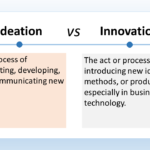The distinction between ideation and innovation lies in their position within the creative and developmental process.
Ideation involves the generation of new ideas.
Innovation is about successfully implementing those ideas to create tangible change or value.

Definition
Ideation
Innovation
Innovation entails the practical execution of ideas, resulting in new or significantly improved goods, services, or processes.
- Characteristics of Innovation:
- Realization: Transforms ideas into actual products, services, or methodologies.
- Implementation: Involve strategies to bring concepts to the market or into use.
- Value Addition: Must create economic, social, or organizational value to be considered successful.
Ideation is the creative process of generating, developing, and communicating new ideas.
- Characteristics of Ideation:
- Brainstorming: Often involves collaborative thinking sessions.
- Conceptualization: Ideas are still in their formative stages.
- Diversity: Encourages a wide range of potential solutions without immediate concern for feasibility.
More Synonyms on innovation, innovate and innovative
Innovation Terms

Innovation is considered as a driving force in progress.
It includes the introduction of novel ideas, methods, or products that bring positive change and advancement.
For more information about innovations, check our glossary
Relationship and Relevance
Ideation is a critical phase in the innovation process, providing the creative fuel from which innovations can emerge. However, without the subsequent steps of development and implementation, ideas alone do not constitute innovation. Thus, ideation is the starting point, and innovation is the outcome.
Ideation
- Ideation is the process of generating, developing, and refining new ideas for a specific goal or purpose.
- It involves the mental process of brainstorming concepts, theories, and creative solutions.
- Ideation is about coming up with the raw material and initial ideas that can potentially lead to innovation.
- The focus is on evaluating, assessing, and improving the quality of ideas through a structured process.
Innovation
- Innovation refers to the process of bringing new ideas into existence and making them real.
- It involves the development, implementation, and commercialization of novel products, services, processes or business models.
- Innovation takes the ideas generated through ideation and turns them into tangible solutions that create value.
- The focus is on taking creative ideas and converting them into operating reality through hard work, processes, and organizational structures.
In summary, ideation is the creative, idea-generation phase, while innovation is the execution and implementation phase that turns those ideas into successful new offerings. Ideation provides the raw material, but innovation is required to actually bring novel solutions to life. Both processes are essential and complementary for driving meaningful change and growth within organizations.
Context for Using Each Term
- Ideation is the term to use when referring to the process of coming up with new ideas, whether in a workshop, during a brainstorming session, or as part of a creative exercise.
- Innovation is used when discussing the transformation of those ideas into real-world applications that result in new or improved offerings.
Example of Utilization
During a company's ideation session, employees come up with the idea of a smartwatch that can monitor blood sugar levels non-invasively. When the company develops a prototype, tests it, and launches a successful product in the market, they have achieved innovation.
In summary, ideation is the imaginative phase where possibilities are envisioned and concepts are crafted, while innovation is the practical phase where those concepts are actualized and delivered with measurable impact.
FAQ
Q: Can ideation occur without leading to innovation?
A: Yes, many ideas generated during ideation may not be developed into innovations due to various factors such as feasibility or resource constraints.
Q: Is innovation possible without ideation?
A: While innovation typically builds on ideas, some innovations may arise from incremental improvements or adaptations of existing solutions without a formal ideation process.
Q: How do ideation and innovation contribute to progress?
A: Ideation provides a pool of creative ideas, while innovation transforms the most promising ideas into practical solutions that drive progress.
Q: Are all ideas from ideation sessions innovative?
A: Not necessarily. Many ideas may be conventional or impractical. Innovation involves selecting and developing the most promising and valuable ideas.
Q: Can innovation inspire new ideation?
A: Absolutely. Successful innovations often reveal new opportunities or challenges, sparking further ideation to address these areas.

